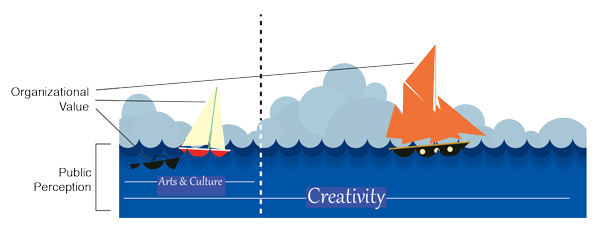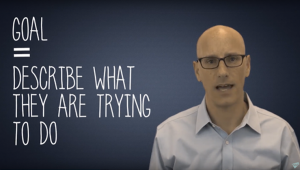What if we tried something different? (I’m not advocating that we stop lobbying congress, but…) What if we saw this as an opportunity to learn from and connect with our communities? What if we broadened our usual scope a bit? To talk about why the arts matter with the true-believers but also with those who don’t engage with us. What if we ask them why, rather than tell them? What if, armed with three simple questions, we went out into our communities and talked to folks who don’t know who we are?
Three simple questions:
- When I say, “the arts” what does that mean to you?
- Where do you see arts in your community?
- Tell me about a moment you connected with arts.
I think these three questions quickly get at some of the basic issues that many cultural leaders struggle with — language, art vs. creativity, defining our audience and connecting with our community.
Language. What are “the arts?” What is “art?” What is “community?” Whose definitions are you using? I’ve often heard language held up as a silver bullet. If we use the right words to describe what we do then everyone will care. I think it’s less about finding the right words and more about understanding that there may be multiple definitions. Think of what we can learn from conversations about those definitions.
Art vs. Creativity.
A couple years ago, I wrote a post (“Raising the Tide of Value”) about how the public’s overall perception of the cultural field is the tide on which our individual value rises and falls. I created this fancy graphic to illustrate the point:
“If you look at the illustration you will notice the dotted line of demarcation separating arts and culture from creativity. Think about your stakeholders, your community – do they know when they are crossing this line? Do they care? While it might be a handy shortcut to use these categories to help talk about our value, they can backfire. (I might actually care about what you do but do not particularly care about ‘the Arts’ or, worse yet, I might think ‘the Arts’ are too stuffy.)”
Defining Audience.
Whom do we serve? For whom are we advocating? Art for whom? You can’t really talk about the value of something unless you define for whom you’re creating value. It’s often made tricky by the fact that for many of us, the folks paying aren’t always the folks participating. We have to be clear who these groups are and what value we are creating for them.
Community Connection.
It’s hard to change what a person cares about, but that’s not the job of advocacy. Advocacy is about connecting what you do to what someone already cares about. That starts with understanding your community. And, that starts with asking questions. Relationships are built one conversation at a time.
Let’s talk about arts advocacy. Let’s talk about art. Let’s talk about community. But most importantly, let’s listen to the responses we get.
So, here’s what we want to do. For the rest of the day and the rest of this week we will be regularly posting content about the value of arts and the importance of hearing from those outside our circle. Next Monday and Tuesday we’ll be featuring some community responses to those 3 simple questions. You can follow along here or on Twitter (#NASadvocacy) and Facebook. Or, you can get involved. As we post content, share it (or any content) with someone outside of the arts — your dentist, your barista, a complete stranger — it doesn’t matter. Let’s get outside our bubbles and truly explore the value of the arts.



